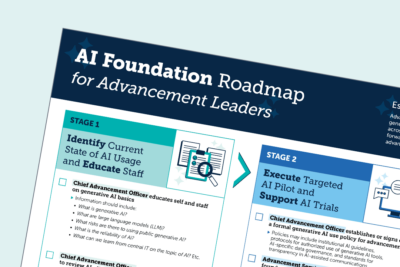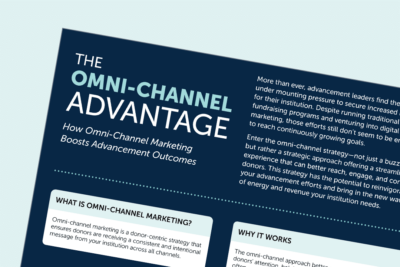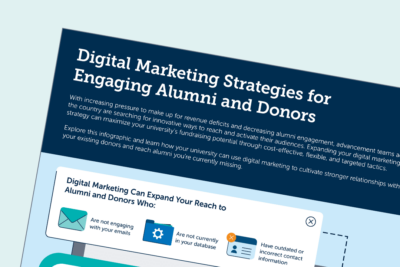5 Reasons Advancement Leaders Must Prioritize Data
Insight Brief for Advancement Leaders
In recent years, shifts in donor behavior, the emergence of new technologies, economic fluctuations, and changing perceptions of higher education have presented both challenges and opportunities for institutions. Advancement leaders must prioritize data to address these changes and build a more successful fundraising program in this new era of advancement.
This insight brief explores five reasons to prioritize data and key considerations for advancement leaders.
-
(Re)connect with lost or unlisted alumni.
Your alumni are invaluable assets for fundraising and program support. However, institutions often encounter challenges in maintaining accurate and comprehensive alumni databases. Over time, contact information may become outdated, or alumni may disengage from your institution.
Advanced data matching algorithms help identify incomplete, outdated, or unknown alumni records by cross-referencing known data points with external consumer databases, similar audience profiles, and users on social media platforms. By using the information you know about alumni, you can track and locate lost or unlisted alumni on digital channels.
-
Ensure you are focused on the right individuals.
Maximizing fundraising efforts amidst limited resources and increasing competition for donor attention depends on reaching the right audience. Insights from data help to identify potential donors more effectively by analyzing engagement patterns and behaviors from multiple data sources. This means you can prioritize outreach to individuals with the highest likelihood to contribute. Focusing on individuals with a data-proven history of supporting your institution—and discontinuing or adjusting engagement with your less responsive segments—optimizes fundraising efforts and maximizes your budget spend for a greater return on investment.
-
Strengthen your donor experience with personalized communications.
Building strong connections with your donors is essential for successful fundraising. Understanding your donors’ interests and motivations allows you to communicate with them in a way that feels personal and meaningful. By using data to learn more about your donors, you can tailor your messages to resonate with their preferences.
Analyzing donor behavior gives you valuable insights into how and when they prefer to give. This helps you predict their future actions and ensures that your messages are delivered at the right time. By prioritizing personalized communication, you can show your donors that you value their support, ultimately leading to increased satisfaction, loyalty, and sustained giving.
-
Better understand the health of your program and optimize accordingly.
Data provides valuable insights to assess the effectiveness of your fundraising efforts and make informed decisions for optimization and sustained growth. By gaining a clear understanding of your program’s health, you can refine communication strategies to better resonate with donors, reallocate resources to high-impact initiatives, and implement targeted interventions to address underperforming areas.
-
Prepare for a future with Artificial intelligence (AI).
Preparing for the integration of AI into the advancement industry is crucial for your institution’s success. This means ensuring your databases are clean, updated, and robust because AI’s success hinges on the quality of the data it relies on. From granular donor details to broader year-over-year trends, all data sources are crucial for AI to function effectively.
Once you have collected substantial amounts of data, AI can transform your fundraising and donor engagement strategies. Tasks that typically require significant time, such as pulling segmented donor lists and creating marketing content, can be automated with AI. Additionally, AI can enhance your understanding of data itself by quickly analyzing what you input and providing actionable insights. This puts your team at a closer starting position than if you were not using it, enabling you to stay ahead of the curve and move more efficiently.
More Resources

AI foundation roadmap for advancement leaders

The omni-channel advantage
